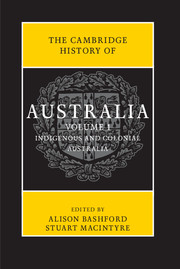Book contents
- Frontmatter
- Contents
- Abbreviations
- List of maps
- List of figures
- List of tables
- Notes on contributors
- Map
- Preface
- Introduction
- PART I
- PART II
- Further reading
- Chronology
- Index
- Frontmatter
- Contents
- Abbreviations
- List of maps
- List of figures
- List of tables
- Notes on contributors
- Map
- Preface
- Introduction
- PART I
- PART II
- 9 Religion
- 10 Culture and media
- 11 Science and medicine
- 12 Society and welfare
- 13 Gender and sexuality
- 14 Indigenous Australia
- 15 Class
- 16 The economy
- 17 Government, law and citizenship
- 18 Education
- 19 The environment
- 20 Travel and connections
- 21 Security
- 22 Australia, Britain and the British Commonwealth
- 23 Australia in the Asia-Pacfic region
- 24 The history anxiety
- Further reading
- Chronology
- Index
14 - Indigenous Australia
from PART II
Published online by Cambridge University Press: 05 November 2013
- Frontmatter
- Contents
- Abbreviations
- List of maps
- List of figures
- List of tables
- Notes on contributors
- Map
- Preface
- Introduction
- PART I
- PART II
- Further reading
- Chronology
- Index
- Frontmatter
- Contents
- Abbreviations
- List of maps
- List of figures
- List of tables
- Notes on contributors
- Map
- Preface
- Introduction
- PART I
- PART II
- 9 Religion
- 10 Culture and media
- 11 Science and medicine
- 12 Society and welfare
- 13 Gender and sexuality
- 14 Indigenous Australia
- 15 Class
- 16 The economy
- 17 Government, law and citizenship
- 18 Education
- 19 The environment
- 20 Travel and connections
- 21 Security
- 22 Australia, Britain and the British Commonwealth
- 23 Australia in the Asia-Pacfic region
- 24 The history anxiety
- Further reading
- Chronology
- Index
Summary
The diverse twentieth-century histories of Aboriginal and Torres Strait Islander people stem from the enduring legacy of the cultures of an estimated 250 separate language groups that existed at the time of British colonisation of Gadigal country in 1788. Bound within the histories of colonisation of the many countries of these separate language groups (increasingly referred to as ‘nations’) are personal stories of survival, loss, transformation and tradition. These stories and the accounts of non-Indigenous people – transported, migrated or born locally – are drawn uncomfortably and at times tragically together in the history of the Australian nation-state.
Different laws in the States and Northern Territory created experiences particular to the Aboriginal and Torres Strait Islander people whose lands exist within them. Opportunities for wider cooperation were limited in the first half of the century by government controls over their lives, but shared experiences of segregation, denial of rights and low status worked over time to create bonds. A growing Indigenous leadership mobilised grassroots political movements that sought improved conditions, an end to inequality, and recognition of rights to land and self-determination. These movements redefined Aboriginal and Torres Strait Islander identity, politics and aspirations in the latter half of the twentieth century, reclaiming Indigenous estates along with judicial, political, cultural and economic reforms. They challenged the nation-state to confront the past and reframe the future to incorporate Aboriginal and Torres Strait Islander people as equal yet holding unique indigenous rights.
Aboriginal and Torres Strait Islander history in the twentieth century is founded in repeated assertions of difference based on millennia of culture, self-government and ownership of distinct territories. Diverse and multiple language groups or nations have asserted rights and responsibilities to country and collective community identity, and to negotiate with the nation-state. For Aboriginal and Torres Strait Islander people, this history begins with imposed ideas of protection, segregation and assimilation and transforms through political campaigns towards equality, recognition of difference and self-determination.
- Type
- Chapter
- Information
- The Cambridge History of Australia , pp. 332 - 357Publisher: Cambridge University PressPrint publication year: 2013
- 1
- Cited by



